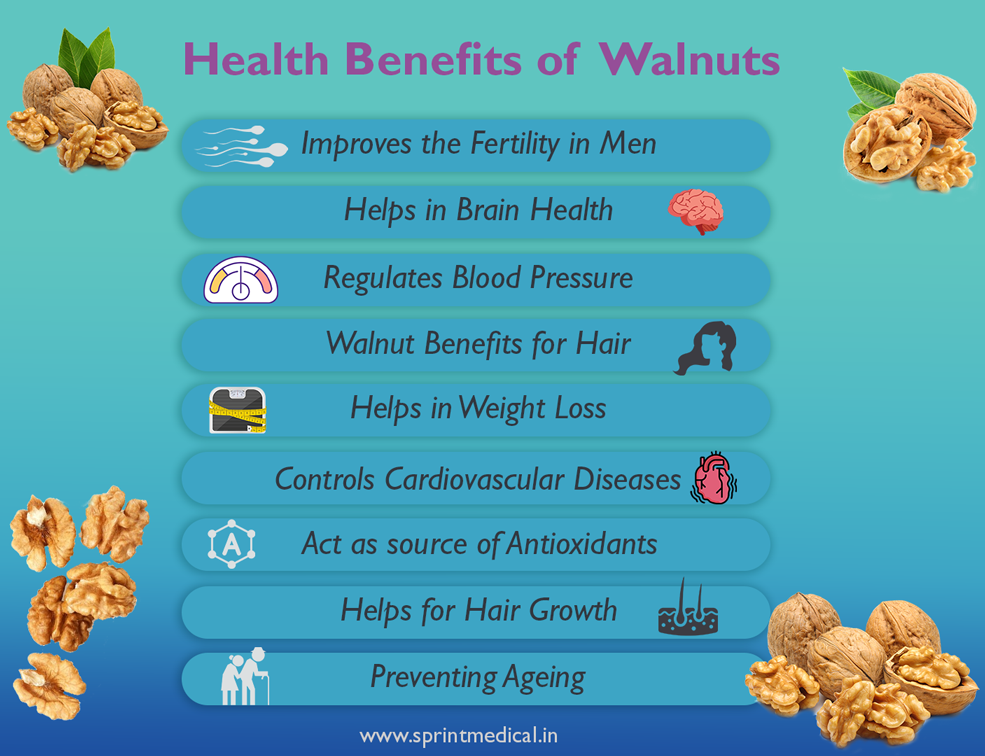
Boost Cognitive Function: The Science-Backed Benefits of Walnuts
The human brain, a three-pound universe teeming with billions of neurons firing in orchestrated chaos, is the epicenter of our experiences, thoughts, and memories. Maintaining its optimal performance is paramount, and increasingly, research points to surprisingly simple dietary interventions that can significantly impact cognitive function. Enter the humble walnut, a powerhouse of nutrients that may be the key to unlocking sharper minds and healthier brains.
The Walnut’s Cognitive Advantage: More Than Just a Crunchy Snack
Walnuts, with their distinctive wrinkled shells and rich, earthy flavor, are more than just a delicious addition to salads or baked goods. These tree nuts boast a unique nutritional profile, brimming with compounds that directly support brain health. Their remarkable cognitive benefits stem from a synergistic blend of:
- Omega-3 Fatty Acids (specifically ALA): Essential fatty acids crucial for brain structure and function. ALA is a precursor to DHA and EPA, fatty acids vital for neuronal membrane fluidity and signal transmission.
- Antioxidants: Vitamin E, melatonin, and polyphenols combat oxidative stress, protecting brain cells from damage caused by free radicals. This protective effect is particularly important as we age.
- Vitamin B6, Folate, and Magnesium: These nutrients play critical roles in various neurological processes, including the synthesis of neurotransmitters crucial for memory, learning, and mood regulation.
Scientific Evidence: Unveiling the Brain-Boosting Power
Numerous studies support the cognitive benefits of walnut consumption. While more research is ongoing, the existing data paints a compelling picture:
A meta-analysis published in the *Journal of Alzheimer’s Disease* indicated that regular walnut consumption might positively influence cognitive performance, particularly in older adults. Other studies have shown improvements in various cognitive domains, including:
- Memory: Enhanced recall and improved memory consolidation.
- Attention: Increased focus and reduced distractibility.
- Executive Function: Improved planning, problem-solving, and decision-making skills.
Importantly, these benefits aren’t limited to older individuals. Studies suggest that incorporating walnuts into a young adult’s diet could provide a foundation for long-term cognitive health.
Beyond the Brain: Holistic Health Benefits
The benefits of walnuts extend beyond cognitive enhancement. They’re a rich source of fiber, contributing to healthy digestion, and their heart-healthy fats can help lower LDL cholesterol levels, reducing the risk of cardiovascular disease. This holistic approach to well-being further underscores the importance of incorporating walnuts into a balanced diet.
Incorporating Walnuts into Your Daily Routine: Simple Strategies
Integrating walnuts into your diet doesn’t require drastic changes. A few simple strategies can make a significant difference:
- Sprinkle chopped walnuts on your morning cereal or yogurt.
- Add them to salads for a boost of flavor and nutrients.
- Enjoy a handful as a healthy snack.
- Incorporate them into baked goods for a delicious and nutritious treat.
- Create a walnut pesto for pasta or as a spread.
A Table Summarizing Walnut’s Cognitive Benefits
| Nutrient | Benefit |
|---|---|
| Omega-3 Fatty Acids | Brain structure & function |
| Antioxidants | Protection against cell damage |
| Vitamin B6, Folate, Magnesium | Neurotransmitter synthesis |
Conclusion: The Nutty Path to a Sharper Mind
The evidence is clear: walnuts offer a compelling pathway to improved cognitive function. Their unique nutritional composition, packed with essential fatty acids, antioxidants, and vital micronutrients, provides a natural and delicious way to support brain health at every stage of life. Incorporating these remarkable nuts into your daily diet could be the simplest, yet most impactful, step towards a sharper, healthier, and more vibrant you.

Additional Information
Boosting Cognitive Function: A Deeper Dive into the Science Behind Walnuts
While the general association between walnut consumption and improved cognitive function is well-established, a deeper analysis reveals a complex interplay of mechanisms and nuanced effects that warrant further exploration. This analysis will delve into the specific bioactive compounds in walnuts, their impact on various cognitive domains, potential synergistic effects with other nutrients, and limitations of current research.
Beyond Omega-3s: The Multifaceted Nature of Walnut’s Cognitive Benefits:
The popular narrative often centers on walnuts’ high alpha-linolenic acid (ALA) content, an omega-3 fatty acid. While ALA is crucial for brain health, contributing to membrane fluidity and neurotransmitter synthesis, attributing all cognitive benefits solely to ALA is an oversimplification. Walnuts are a rich source of other bioactive compounds that synergistically contribute to cognitive enhancement:
- Vitamin E: Specifically, alpha-tocopherol, a potent antioxidant, protects brain cells from oxidative stress, a major contributor to age-related cognitive decline. Studies have linked higher vitamin E intake to a reduced risk of Alzheimer’s disease and improved cognitive performance in elderly individuals.
- Polyphenols: Walnuts are abundant in various polyphenols, including ellagic acid and melatonin. These possess potent antioxidant and anti-inflammatory properties. Inflammation is increasingly implicated in neurodegenerative diseases, and polyphenols may mitigate this risk by modulating inflammatory pathways in the brain. Melatonin, known for its role in sleep regulation, also plays a crucial role in neuroprotection and antioxidant defense.
- Fiber: Adequate fiber intake supports gut health, and emerging research highlights the “gut-brain axis,” emphasizing the bidirectional communication between the gut microbiota and the brain. Walnuts’ fiber content may contribute to improved gut microbiota composition, indirectly benefiting cognitive function.
Specificity of Cognitive Enhancement:
While walnuts show promise in improving overall cognitive function, the effects may not be uniform across all cognitive domains. Research suggests that walnuts might be particularly beneficial for:
- Memory: Studies, though not all conclusive, suggest improvements in working memory and verbal memory following walnut consumption. This could be attributed to the combined effects of ALA, vitamin E, and polyphenols on synaptic plasticity and neurogenesis.
- Executive function: This umbrella term encompassing planning, problem-solving, and cognitive flexibility may also see improvement, though further research with rigorous methodologies is needed to solidify these claims. The impact on executive function might be linked to walnuts’ ability to reduce oxidative stress and inflammation, factors that impede efficient cognitive control.
- Attention and concentration: While some studies hint at potential benefits, the evidence in this area remains relatively limited and requires more robust investigation.
Synergistic Effects and Dietary Considerations:
The cognitive benefits of walnuts may be amplified when consumed as part of a broader healthy diet rich in fruits, vegetables, and other brain-boosting nutrients. For example, the combination of walnuts’ ALA with other omega-3 fatty acids like EPA and DHA (found in fatty fish) might offer synergistic effects, leading to more pronounced cognitive improvements. However, it’s important to note that the body needs to convert ALA to EPA and DHA, and this conversion efficiency varies among individuals.
Limitations of Current Research and Future Directions:
While encouraging, the current body of research on walnuts and cognitive function has limitations:
- Most studies are observational: Establishing causal relationships between walnut consumption and cognitive enhancement requires randomized controlled trials (RCTs) with larger sample sizes and longer follow-up periods.
- Variability in study designs and methodologies: This hinders direct comparisons and limits the strength of overall conclusions.
- Lack of clarity on optimal dosage: The ideal amount of walnuts for optimal cognitive benefit needs further investigation.
Future research should focus on well-designed RCTs, investigating the specific mechanisms underlying the observed cognitive improvements, and determining optimal dosage and consumption patterns for maximum efficacy. Furthermore, exploring potential interactions with other dietary components and genetic factors is crucial for personalized recommendations.
In conclusion, while the evidence supporting walnuts’ positive influence on cognitive function is compelling, it’s crucial to interpret the findings cautiously. The multifaceted nature of walnut’s bioactive compounds suggests a synergistic effect contributing to cognitive benefits, but further research is needed to fully elucidate the mechanisms and optimal strategies for leveraging their cognitive-enhancing potential.
